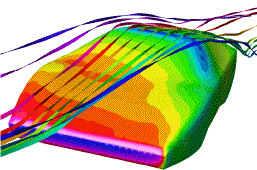15-853: Algorithms in the "Real World"
Carnegie Mellon University, Computer Science Department
Spring 2012

- Instructors:
Guy Blelloch
- Time: Tuesday and Thursday 1:30 - 2:50,
Note: first class is Thursday January 19
- Place: 4303 Gates Center
- Credit: 12 Units
- Prerequisites: An advanced undergrad course in algorithms
(15-451 or equivalent will suffice).
- Office Hours: Monday 1:00-2:00pm
Announcements:
Course Overview:
This course covers how algorithms and theory are used in "real-world"
applications. The course will cover both the theory behind the
algorithms and case studies of how the theory is applied. It is
organized by topics and the topics change from year to year.
This year we will cover the following topics. The exact subtopics
might change
Requirements and Grading Criteria
Assignments
Guy Blelloch,
guyb@cs.cmu.edu.

